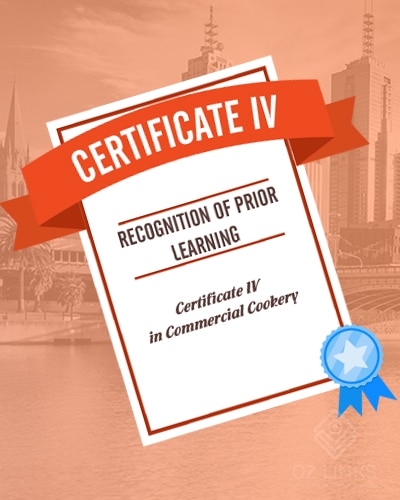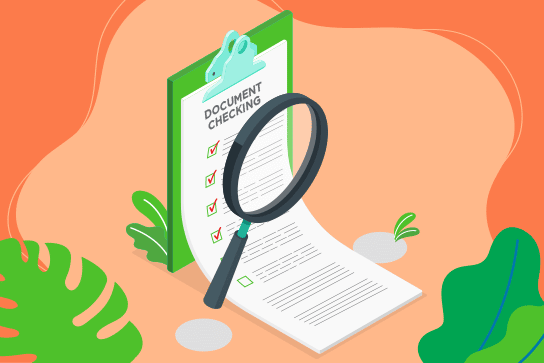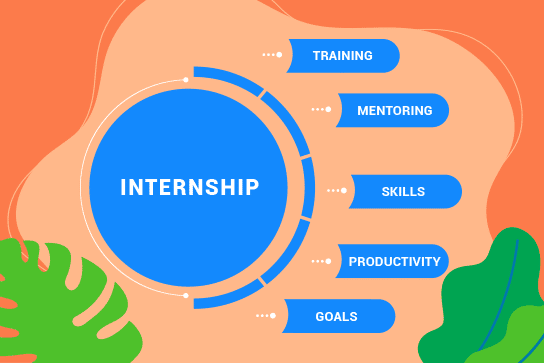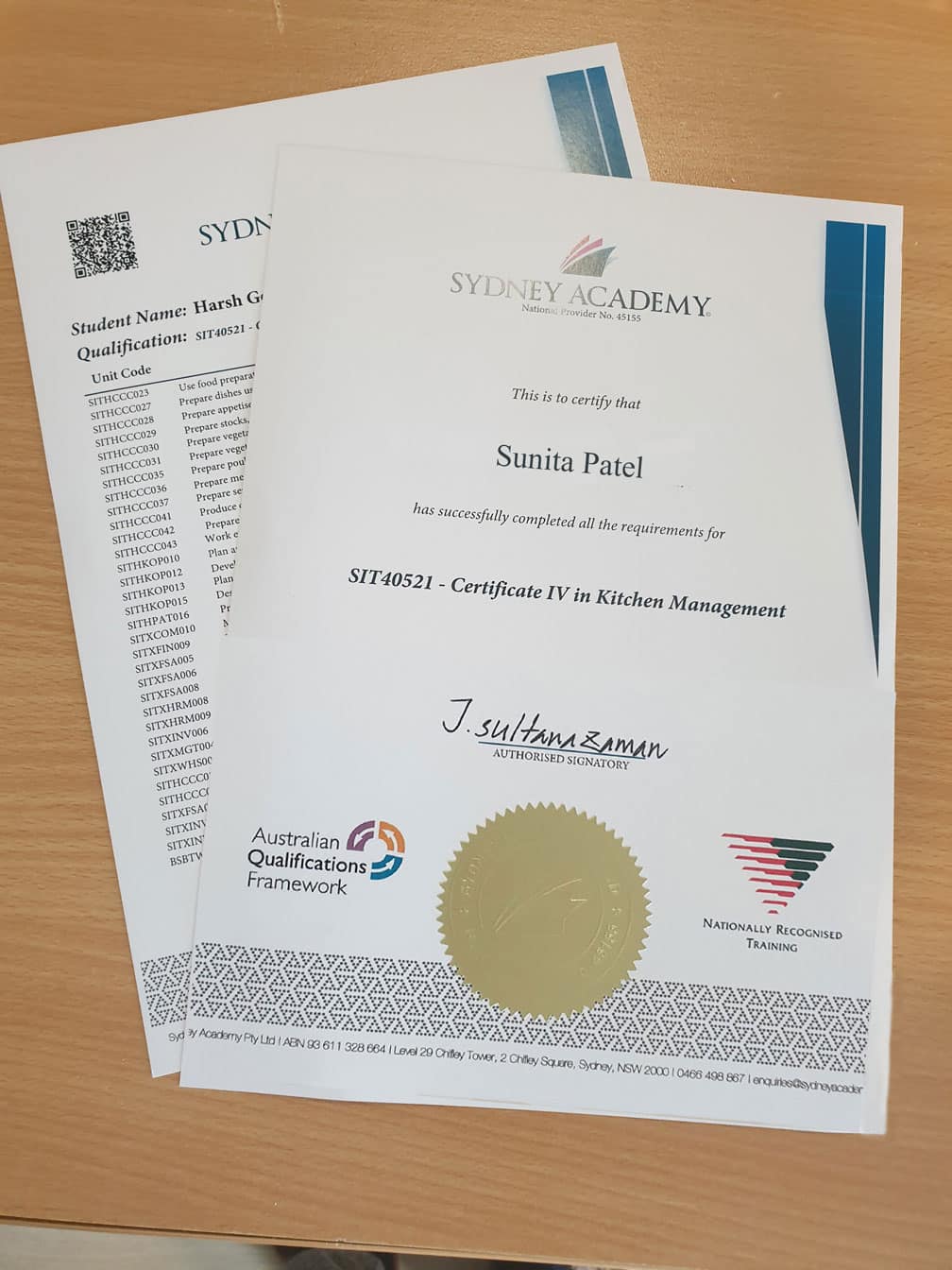LISTEN AUDIO
Last Updated on November 14, 2023 by Ozlinks Education
Qualification Overview
This certification is appropriate for chefs and cooks who are in a managerial or head chef capacity. They work with little to no supervision, relying on their own judgement to address complex issues.
This certificate opens doors to careers in the hospitality industry at places like hotels, restaurants, bars, and cafes, as well as at the helm of one’s own establishment.
With this certification, you can work as a chef in a dining or catering facility, planning, and organising food preparation and cooking. For more information about visa options for the occupation Chef, please visit ANZSCO: 351311.
Qualification Name
Certificate IV in Kitchen Management
Qualification Code
SIT40521
Why do I need this qualification?
Obtaining a Certificate IV in Kitchen Management may boost your job prospects and earnings. This can be accomplished with the skills you already have, providing access to better positions such as chef de parties, demi chef, second chef, sou chef, and head chef, and allowing you to negotiate a higher salary.
International students and migrants may require the Certificate IV in Kitchen Management as part of their migration skill assessment for visa 491, visa 494, and visa 482 applications. If you need skills assessment support, please contact us.
What does a chef do?
Chefs develop menus, arrange supplies, and supervise daily food preparation in commercial kitchens like restaurants and other food-service establishments. They supervise kitchen staff and address any food-related issues.
Their job involves:
- planning menus, estimating food and labor costs, and ordering food supplies.
- monitoring quality of dishes at all stages of preparation and presentation.
- discussing food preparation issues with Managers, Dietitians and kitchen and waiting staff.
- demonstrating techniques and advising on cooking procedures.
- preparing and cooking food.
- explaining and enforcing hygiene regulations.
- may select and train staff.
- may freeze and preserve foods.
About Certificate IV in Kitchen Management
To achieve this qualification, competency must be demonstrated in:
33 units of competency must be completed:
- 27 core units
- 6 elective units, consisting of:
3 elective units from Group A below
3 elective units from the electives listed below or from any current endorsed Training Package or accredited course.
Note: Units marked with an *asterisk have one or more prerequisites.
Core Units
|
SITHCCC023* |
Use food preparation equipment |
|
SITHCCC027* |
Prepare dishes using basic methods of cookery |
|
SITHCCC028* |
Prepare appetisers and salads |
|
SITHCCC029* |
Prepare stocks, sauces and soups |
|
SITHCCC030* |
Prepare vegetable, fruit, eggs and farinaceous dishes |
|
SITHCCC031* |
Prepare vegetarian and vegan dishes |
|
SITHCCC035* |
Prepare poultry dishes |
|
SITHCCC036* |
Prepare meat dishes |
|
SITHCCC037* |
Prepare seafood dishes |
|
SITHCCC041* |
Produce cakes, pastries and breads |
|
SITHCCC042* |
Prepare food to meet special dietary requirements |
|
SITHCCC043* |
Work effectively as a cook |
|
SITHKOP010 |
Plan and cost recipes |
|
SITHKOP012* |
Develop recipes for special dietary requirements |
|
SITHKOP013* |
Plan cooking operations |
|
SITHKOP015* |
Design and cost menus |
|
SITHPAT016* |
Produce desserts |
|
SITXCOM010 |
Manage conflict |
|
SITXFIN009 |
Manage finances within a budget |
|
SITXFSA005 |
Use hygienic practices for food safety |
|
SITXFSA006 |
Participate in safe food handling practices |
|
SITXFSA008* |
Develop and implement a food safety program |
|
SITXHRM008 |
Roster staff |
|
SITXHRM009 |
Lead and manage people |
|
SITXINV006* |
Receive, store and maintain stock |
|
SITXMGT004 |
Monitor work operations |
|
SITXWHS007 |
Implement and monitor work health and safety practices |
Elective Units
Group A – Cookery and Catering
|
SITHCCC026* |
Package prepared foodstuffs |
|
SITHCCC032* |
Produce cook-chill and cook-freeze foods |
|
SITHCCC033* |
Re-thermalise chilled and frozen foods |
|
SITHCCC038* |
Produce and serve food for buffets |
|
SITHCCC039* |
Produce pates and terrines |
|
SITHCCC040* |
Prepare and serve cheese |
|
SITHCCC044* |
Prepare specialised food items |
|
SITXFSA007* |
Transport and store food |
|
SITHKOP011* |
Plan and implement service of buffets |
|
SITHKOP014 |
Plan catering for events or functions |
Group B – Asian Cookery
|
SITHASC021* |
Prepare Asian appetisers and snacks |
|
SITHASC022* |
Prepare Asian stocks and soups |
|
SITHASC023* |
Prepare Asian sauces, dips and accompaniments |
|
SITHASC024* |
Prepare Asian salads |
|
SITHASC025* |
Prepare Asian rice and noodles |
|
SITHASC027* |
Prepare Asian cooked dishes |
|
SITHASC028* |
Prepare Asian desserts |
|
SITHASC033* |
Prepare dim sum |
Group C – Patisserie
|
SITHPAT012* |
Produce specialised cakes |
|
SITHPAT014* |
Produce yeast-based bakery products |
|
SITHPAT015* |
Produce petits fours |
|
SITHPAT017* |
Prepare and model marzipan |
|
SITHPAT018* |
Produce chocolate confectionery |
|
SITHPAT019* |
Model sugar-based decorations |
|
SITHPAT020* |
Design and produce sweet showpieces |
Group D – Food and Beverage
|
SITHFAB021 |
Provide responsible service of alcohol |
|
SITHFAB023* |
Operate a bar |
|
SITHFAB025* |
Prepare and serve espresso coffee |
|
SITHFAB027* |
Serve food and beverage |
|
SITHFAB034* |
Provide table service of food and beverage |
Group E – General electives
|
BSBTWK501 |
Lead diversity and inclusion |
|
HLTAID011 |
Provide First Aid |
|
SIRXOSM002 |
Maintain ethical and professional standards when using social media and online platforms |
|
SIRXOSM003* |
Use social media and online tools |
|
SIRXOSM006* |
Develop and manage social media and online strategies |
|
SIRXOSM007* |
Manage risk to organisational reputation in an online setting |
|
SITXCCS014 |
Provide service to customers |
|
SITXCCS015 |
Enhance customer service experiences |
|
SITXFIN008 |
Interpret financial information |
|
SITXHRM010 |
Recruit, select and induct staff |
|
SITXINV007 |
Purchase goods |
|
SITXINV008 |
Control stock |
|
SITXWHS006 |
Identify hazards, assess and control safety risks |
Why RPL?
The Australian qualification that comes from registered training organisations (RTOs), also known as the qualification that is nationally recognised, can assist you in meeting any of the requirements listed below. The RPL program is suitable for people who:
- Don't have a degree but do have work experience in their field.
- You want to work in Australia, but you don't have an Australian degree.
- Want to apply for working visa but don't meet the visa requirements.
- You need a formal qualification to open a business in Australia.
- To work in the trade industry, you need to get a trade license and qualification.
- You need to apply for trade license to work in the trade industry.
- An Australian degree helps you to work in an international project with a higher salary.
All of these problems are very common in Australia's migration community. With the RPL program, you can turn your work experience of a year or more, anywhere in Vietnam or Australia, into an Australian qualification from certificates II, III, IV, and Diploma to the Advanced Diploma. With Australian qualifications, you can definitely solve all of the problems listed above and get a higher salary.
RPL Qualifications
A title
Image Box text
The advantages of using RPL
The RPL program converts work experience into an Australian qualification that can help you obtain a formal qualification that matches your current knowledge and skills, thereby contributing to your professional development, learning practice and socialize and your self-esteem to integrate into the Australian working environment is enhanced. RPL helps you:
- There is no need to learn what you already know.
- It saves you time and tuition fees.
- Open new career opportunities.
- Help you achieve your career change goals in Australia.
- Obtaining an Australian qualification takes less time.
- You don't have to take classes or repeat the training you've already done.
- It's a quick and easy process to get a recognized qualification in Australia.
Frequently Asked Questions
Below is a list of questions that our customers often ask us. If you need more information, don't hesitate to contact Ozlinks Education now.
The RPL is generally a faster way to an Australian qualification than completing a formal training course because it recognizes your previous work experience.
Yes. The RPL evaluation process is just as thorough as any other evaluation. But the evidence you need to show may be different from what is usually asked in a class assessment.
When the criteria for each of the subjects are met, a degree may be partially or fully accredited. For example, only completed subjects can be counted towards the qualification.
Even if your credits aren't enough to qualify, you can still receive written certification of the courses you've completed.
This will depend on the complexity of your qualification, how many subjects you apply for and how long it takes you to gather proof of work experience, collate and submit proof. Usually, the RPL process is 6 to 8 weeks from the date of application to the RPL assessment institute and also depends on your industry and qualifications.





